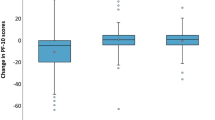Abstract
For a number of years, patients have anecdotally reported changes in memory and concentration problems after receiving chemotherapy for breast cancer. Neuropsychological studies have been performed to seek objective evidence as to the existence and extent of this phenomenon; however, these studies were primarily performed in younger women and there is sparse data regarding the impact of adjuvant chemotherapy on an older woman’s cognition. The objective of this paper was to evaluate the current literature in order to propose ways to overcome methodological limitations of studies to consider whether chemotherapy-associated cognitive dysfunction exists in older patients and if so, who is at risk. A systematic review of relevant literature was performed including study design, mean age of participants, treatment received, neuropsychological tests employed, timing of assessments, definition of cognitive impairment, and results. The literature primarily consists of small studies, which lack a prospective longitudinal design, vary in design measures, and exclude older patients who are at greatest risk for cognitive impairment. Since aging is the number one risk factor for breast cancer, future studies of the neuropsychological impact of chemotherapy should include older patients.
Similar content being viewed by others
References
Wefel JS, Lenzi R, Theriault RL, Davis RN, Meyers CA (2004) The cognitive sequelae of standard-dose adjuvant chemotherapy in women with breast carcinoma: results of a prospective, randomized, longitudinal trial. Cancer 100:2292–2299
Weineke MH, Dienst E (1995) Neuropsychological assessment of cognitive functioning following chemotherapy for breast cancer. Psycho-Oncology 4:61–66
Brezden CB, Phillips K, Abdolell M, Bunston T et al (2000) Cognitive function in breast cancer patients receiving adjuvant chemotherapy. J Clin Oncol 18(14):2695–2701
Schagen SB, Van Dam F, Muller MJ et al (1999) Cognitive deficits after postoperative adjuvant chemotherapy for breast carcinoma. Cancer 85(3):640–650
Van Dam FSAM, Schagen SB, Muller MJ et al (1998) Impairment of cognitive function in women receiving adjuvant treatment for high-risk breast cancer: high dose versus standard dose chemotherapy. J Natl Cancer Inst 90(3):210–218
Schagen SB, Muller MJ, Boogerd W, Rosenbrand RM, van Rhijn D, Rodenhuis S, van Dam FS (2002) Late effects of adjuvant chemotherapy on cognitive function: a follow-up study in breast cancer patients. Ann Oncol 13(9):1387–1397
Ahles TA, Saykin AJ, Furstenberg CT, Cole B, Matt LA, Skalla K, Whedon MB, Bivens S, Mitchell T, Greenberg ER, Silberfarb PM (2002) Neuropsychologic impact of standard-dose systemic chemotherapy in long-term survivors of breast cancer and lymphoma. J Clin Oncol 20:485–493
Castellon SA, Ganz PA, Bower JE, Petersen L, Abraham L, Greendale GA (2004) Neurocognitive performance in breast cancer survivors exposed to adjuvant chemotherapy and tamoxifen. J Clin Exp Neuropsychol 26(7):955–969
Tchen N, Juffs HG, Downie FP, Yi Q, Hu H, Chemerynsky I, Clemons M, Crump M, Gross PE, Warr D, Tweedale ME, Tannock I (2003) Cognitive function, fatigue, and menopausal symptoms in women receiving adjuvant chemotherapy for breast cancer. J Clin Oncol 21:4175–4183
Hurria A, Rosen C, Hudis C, Zuckerman E, Panageas K, Lachs MS, Witmer M, van Gorp W, Fornier M, D’Andrea G, Moasser M, Dang C, VanPoznak C, Currie V, Theodoulou M, Robson M, Hurria A, Pearce C, Norton L, Holland J (2006) Effect of adjuvant chemotherapy on the cognitive function of older patients with breast cancer. J Am Geriatr Soc 54(6):925–931
Wilkinson GS (1993) The Wide Range Achievement Test, Revised (WRAT-3). Wide Range, Wilmington
Kaplan EF, Goodglass H, Weintraub S (1983) The Boston Naming Test, 2nd edn. Lea & Febiger, Philadelphia
Benton AL, Hamscher K de S (1989) Multilingual Aphasia Examination. AJA Associates, Iowa City
Bennedict RHB, Schretlen D, Groninger L, Brandt J (1998) Hopkins Verbal Learning Test-Revised: normative data and analysis of inter-form and test–retest reliability. Clin Neuropsychol 12:43–55
Meyers J, Meyers K (1996) The Meyers scoring system for the Rey complex figure and the recognition trial: professional manual. Psychological Assessment Resources, Odessa
Rey A (1941) L’examen psychologique dans les cas d’encephalopathie traumatique. Arch Psychol 28:286–340
Osterrieth PA (1944) Le test de copie d’une figure complexe. Arch Psychol 30:206–356
Wechsler D (1997) Wechsler Adult Intelligence Scale, 3rd edn. (WAIS-III). Harcourt Brace & Co., San Antonio
Reitan RM (1958) The validity of the Trail Making Test as an indicator of organic brain damage. Percept Mot Skills 8:271–276
Golden CJ (1978) Stroop Color and Word Test. Stoelting, Chicago
Acknowledgments
This work was supported by the Dr Hurria’s Paul B. Beeson Career Development Award in Aging (K23 AG026749-01) and American Society of Clinical Oncology-Association of Specialty Professors-Junior Development Award in Geriatric Oncology. The authors would like to thank Carol A. Pearce, MFA for her assistance in the preparation of this manuscript.
Author information
Authors and Affiliations
Corresponding author
Rights and permissions
About this article
Cite this article
Hurria, A., Lachs, M. Is cognitive dysfunction a complication of adjuvant chemotherapy in the older patient with breast cancer?. Breast Cancer Res Treat 103, 259–268 (2007). https://doi.org/10.1007/s10549-006-9383-9
Received:
Accepted:
Published:
Issue Date:
DOI: https://doi.org/10.1007/s10549-006-9383-9




